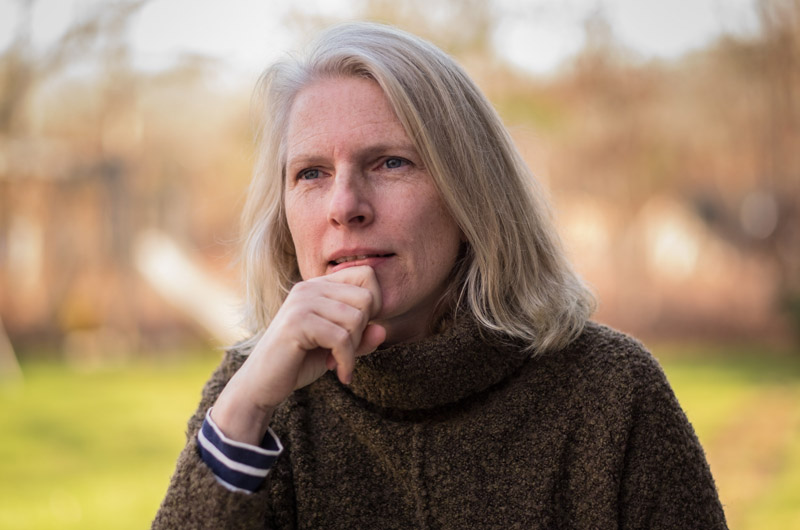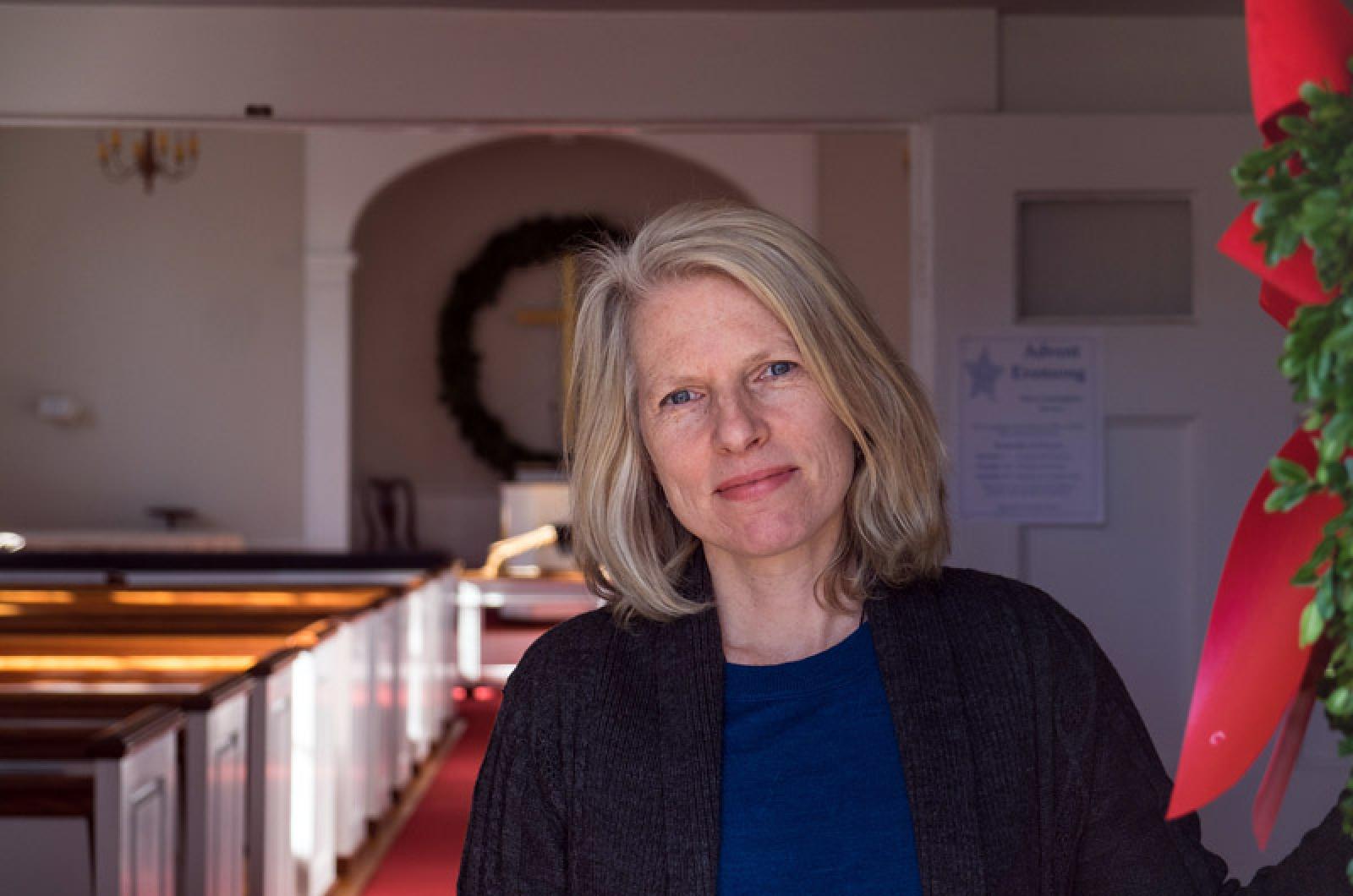When Rev. Cathlin Baker was five years old, she was given a secret mantra and began practicing transcendental meditation. She would silently repeat the mantra as she made breakfast, played with friends or just went about her day.
The practice didn’t last for long but it was the beginning of a long and unpredictable journey, to her at least, that eventually led to a life of pastoral service on the Island. She became the minister of the First Congregational Church of West Tisbury in 2008.
In August of this year, Ms. Baker began a four-month sabbatical, which she spent in Scotland, thanks in part to a grant from the Louisville Institute, based at the Louisville Seminary in Kentucky. The institute funds research by clergy exploring issues relating to the future of the North American church.
Currently, thousands of mainline churches are now closing their doors every year as attendance drops, which Reverend Baker believes may be a result of more people finding solace in other community activities, or simply not having the time. But coming from a family where eastern religions held the day, and ending up as a Congregationalist minister on the Vineyard, she knows that no personal story is written in stone.
“There is a lot about Christianity that is relevant for everybody,” she said. “And maybe we are in a different age that’s less fixated on belief, and more interested in practice and experience.” In some ways, she said, it’s a return to the basics, since the early church also emphasized faith and practice over dogma.
As pastor in West Tisbury, Reverend Baker has made it a priority to understand and embrace the range of experiences that bring people to church. To that end, and as part of the grant, she has been working with her parishioners to track their spiritual journeys and share their stories with the congregation. The first group completed the program this summer, with two more groups planned for the new year.

“I was mainly looking at people who had rejected the church of their childhood, grew up not going to church or consider themselves spiritual but not religious. And yet all these types of people are coming to church,” she said. “And then I realized if I was going to ask my congregants to walk that journey I had to do it myself, which is what I did in Scotland.”
Scotland was an ideal location for her sabbatical, she said, in part because of her own Celtic heritage (her father was Irish) and her longstanding affinity for Celtic theology.
“What is attractive for me is the way that they view nature and the world,” she said. “These tangible, every-moment expressions of the divine.” She has also found inspiration in the long history of women leaders within Celtic Christianity.
In Scotland, Ms. Baker spent time with ministers in Glasgow, in particular those working in poor, urban communities. She also went on two spiritual retreats, one to Perth and one to the Isle of Iona.
The Iona community was founded in 1938 by George MacLeod. Like the Vineyard it is a small island only accessible by ferry.
“The time on Iona felt like a bridge between my father’s Celtic mysticism and my own relationship to church, which is more incarnational,” Ms. Baker said. “It was a meeting of the mystical and the material.”
Although her faith is now grounded in the church, she grew up in a household that did not attend church. Her parents were both what they called “recovering Catholics” who had turned away from the dogma of the church. As a young man, her father was even put through an exorcism by a group of nuns who felt he was too unruly. He left the church and never looked back.
While in Scotland, Ms. Baker spent time reflecting on her early experiences, which she saw as planting a seed for her later life in the church. “I had this longing for community, and it ended up making me very attracted to social movements, which I still identify with a lot,” she said. “That kind of stuff, where people came together with shared values, that had a lot of appeal for me.”
She earned a master’s degree from Union Theological Seminary in New York city, but her degree was focused more on Christian ethics. She never expected to become a minister, she said, until a mystical experience occurred while attending a women’s rights conference in Havana, Cuba. A few months earlier, her mother died and she was still deep in the grieving process. She recalled suddenly falling back onto her bed in a hotel room and hearing the words, “Anything is possible.” Instead of resisting the experience, she tried to engage with it, and to decipher the meaning of the words.
What was possible? she wondered. “Pretty quickly, I realized it was the ministry.”
Scotland provided an opportunity to look back on her life as a spiritual but not religious seeker. And her view during the time, like that of her congregants, was from the pew rather than the pulpit, as she attended the Gorbals Parish Church in Glasgow, led by Ian Galloway.
“I had never met him before, and we really connected,” Reverend Baker said. Mr. Galloway even drove her and her children on several sightseeing tours outside the city.
Reverend Baker returned to her pulpit on the Vineyard last Sunday. During her absence the church was led by Terry Newberry, a retired minister who lives on Cape Cod.
After the Christmas holidays, she plans to continue to help her parishioners track their spiritual journeys, this time anchored by the work she did on her sabbatical.
“Even when people come from really different backgrounds and have really different stories, there is a lot in common about why we choose church,” she said, noting the beauty of the space, the music, and the chance to interact with people of all ages.
Looking ahead, she sees the growth of secularism less as a threat than an opportunity to further refine her ministry and meet the needs of society.
“I know that whether people are going to church or not, they are still having spiritual experiences,” she said.
Among other things, the West Tisbury church partners with several Island nonprofits, including Island Grown Gleaning and the Family to Family program, to bring about change in the community, with a current focus on hunger and homelessness.
“We see a lot of suffering,” Ms. Baker said of her work on the Island. But a core tenet of her ministry is to encourage people to relate to suffering not just as a burden but as a bridge to other people, and a way to find common ground.
“For us, it doesn’t just stop on Sundays,” she said of the type of engaged spirituality practiced by the congregation. “It’s how we take that into the world.”




Comments (3)
Comments
Comment policy »